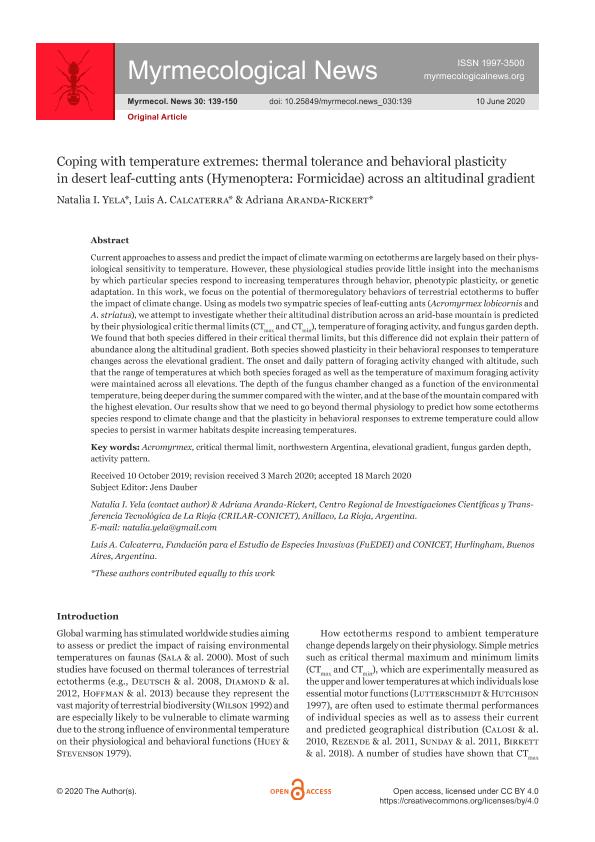Artículo
Coping with temperature extremes: thermal tolerance and behavioral plasticity in desert leaf-cutting ants (Hymeno ptera: Formicidae) across an altitudinal gradient
Fecha de publicación:
10/06/2020
Editorial:
Oesterreichische Gesell Entomofaunistik
Revista:
Myrmecological News
ISSN:
1994-4136
Idioma:
Inglés
Tipo de recurso:
Artículo publicado
Clasificación temática:
Resumen
Current approaches to assess and predict the impact of climate warming on ectotherms are largely based on their physiological sensitivity to temperature. However, these physiological studies provide little insight into the mechanisms by which particular species respond to increasing temperatures through behavior, phenotypic plasticity, or genetic adaptation. In this work, we focus on the potential of thermoregulatory behaviors of terrestrial ectotherms to buffer the impact of climate change. Using as models two sympatric species of leaf-cutting ants (Acromyrmex lobicornis and A. striatus), we attempt to investigate whether their altitudinal distribution across an arid-base mountain is predicted by their physiological critic thermal limits (CTmax and CTmin), temperature of foraging activity, and fungus garden depth. We found that both species differed in their critical thermal limits, but this difference did not explain their pattern of abundance along the altitudinal gradient. Both species showed plasticity in their behavioral responses to temperature changes across the elevational gradient. The onset and daily pattern of foraging activity changed with altitude, such that the range of temperatures at which both species foraged as well as the temperature of maximum foraging activity were maintained across all elevations. The depth of the fungus chamber changed as a function of the environmental temperature, being deeper during the summer compared with the winter, and at the base of the mountain compared with the highest elevation. Our results show that we need to go beyond thermal physiology to predict how some ectotherms species respond to climate change and that the plasticity in behavioral responses to extreme temperature could allow species to persist in warmer habitats despite increasing temperatures.
Archivos asociados
Licencia
Identificadores
Colecciones
Articulos(CRILAR)
Articulos de CENTRO REGIONAL DE INV. CIENTIFICAS Y TRANSFERENCIA TECNOLOGICA DE ANILLACO
Articulos de CENTRO REGIONAL DE INV. CIENTIFICAS Y TRANSFERENCIA TECNOLOGICA DE ANILLACO
Articulos(SEDE CENTRAL)
Articulos de SEDE CENTRAL
Articulos de SEDE CENTRAL
Citación
Yela, Natalia Ines; Calcaterra, Luis Alberto; Aranda Rickert, Adriana Marina; Coping with temperature extremes: thermal tolerance and behavioral plasticity in desert leaf-cutting ants (Hymeno ptera: Formicidae) across an altitudinal gradient; Oesterreichische Gesell Entomofaunistik; Myrmecological News; 30; 10-6-2020; 139-150
Compartir
Altmétricas




